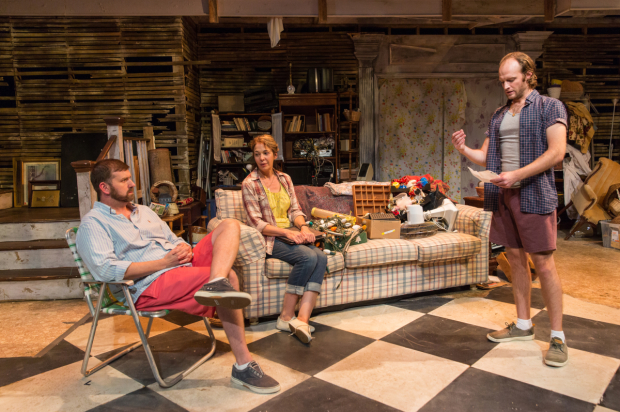Appropriate
Conflicts within a white, dysfunctional family nearly bury the central issue of race in Branden Jacobs-Jenkins play.

(© Nile Hawver / Nile Scott Shots)
Ray's children, who have gathered to mourn their father's death and sell off his house and possessions, have no idea what lies buried beneath the piles of junk, tissue-paper wrapped objects, stacked chairs and other remains of their father's life, including a scrapbook of disturbing photos that reveal a racist side of their father they never knew. Family secrets are uncovered and sibling conflict comes to a boil in the SpeakEasy Stage Company's production of Branden Jacobs-Jenkins' play Appropriate.
Welcome to the world of the Lafayette family, descended from ancestors who inhabited the decayed Arkansas mansion that's spread out with all its garbage and rotting timbers (evocatively designed by Cristina Todesco). After a long opening scene in total darkness, accompanied by the loud, rhythmic sound of chirping cicadas, the two-story house is gradually revealed by flashlight as Franz sneaks into his childhood home through a window (lighting design by Wen-Ling Liao; sound design by Arshan Gailus), with his siblings Toni, Bo, and their significant others, joining him in the house as the play progresses.
Jacobs-Jenkins deliberately fashions characters who are clichés, borrowed from the canon of famous American dramas so that the characters feel like a who's who of the American stage with shades of Letts, O'Neill, Wilson, Shepard, and Williams. However, Jacobs-Jenkins offers a fresh and compelling perspective to the genre, aided mightily by the impressive ensemble gathered by director M. Bevan O'Gara. These characters manage to hold our focus while underlining the playwright's intention: to point out how the refusal to face the reality of both family dynamics and the race relation issues that continue to poison American society. O'Gara stages each scene as a separate vignette or chapter that allows her to build one coherent (if somewhat lengthy) view of familial relationships, conflicts and all.
Melinda Lopez as Toni, the embittered and loyal older sister, leads the cast. She is joined by Bryan T. Donovan, in the role of Bo, the blustering Wall Street-mogul; Tamara Hickey as Rachael, his Jewish wife and a helicopter mother; Alex Pollack as the drifter-grifter brother Franz, who stops the show with his riveting second-act monologue of contrition; and Ashley Risteen, as his hippy girlfriend, River, the sanest one of the bunch, despite her affinity for spirits. Eliott Purcell appears as Rhys, Toni's highly troubled son; Katie Elinoff plays Cassidy, Bo, and Rachel's daughter, who is a bit too smart-mouthed for her age; with Brendan O'Brien as her younger, bratty brother. The actors knit together well as a family unit, thrusting into each other’s sore spots even though the characters have been separated for years. Some of them even manage to comfort one another, with one moving scene between the brittle Rachael, and her macho-husband, Bo, when he breaks into tears at the destruction of his childhood memories.
Unfortunately, the good work set forth by Jacobs-Jenkins begins to unravel in a coup de theatre, tacked on in a confusing epilogue which is meant to suggest change, in a future where all races have equal rights. However, this dream sequence is less convincing than the troubles of the characters who have held center stage for the rest of the evening.









